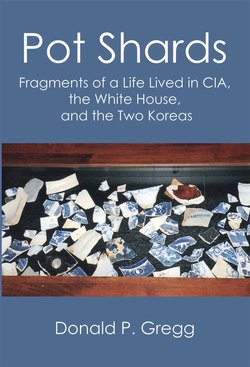Читать книгу Pot Shards: Fragments of a Life Lived in CIA, the White House, and the Two Koreas - Donald P. Gregg - Страница 4
На сайте Литреса книга снята с продажи.
Thanks and Recollections
ОглавлениеFirst of all, I am very grateful to Andrew Szanton, my long-time editor, and to Margery Thompson, ADST publishing director and series editor, who have worked so well as a team, and have done so much to bring Pot Shards into publishable form. I am also grateful to my son John, twenty-five years a journalist, for his professional judgments along the way.
Next I want to mention Tapani Kaskeala, my great friend in Helsinki. I sent him the chapter “The Finnish Connection” as a gesture of friendship. Thanks to him it was printed in Finland’s leading magazine in the fall of 2013. Thank you, Tapani.
Turning to Korea, I want to thank professors Chung-in Moon and John Delury of Yonsei University for using excerpts from Pot Shards in their book Bound by Destiny, dealing with my activities in Korea over the past forty years.
Then along the way, several close friends have read Pot Shards in its various nascent forms, and encouraged me by their comments. In particular I want to thank Lucy Blanton, Jane and Bob Geniesse, Alice Gorman, Jan Harrison, Lorrie Harrison, Carla Hawryluk, Sue and Jack McMahon, and Jane Wood.
In the writing process, as I dug back deep into the past, people re-emerged who meant a great deal to me at the time I knew them. I believe that their collective impact was one of the major factors that led me to write this book.
In Japan, Tsuruko Asano and Honda sensei (first name lost), both magnificent teachers, pushed my Japanese to the point that I could move freely and confidently in the cities, the small towns, and the mountains of Japan. Artist Kado Hiroshi, whose portrait of Meg graces our dining room, opened up his home and his family to us as very few Japanese did in those days.
In Burma, Bibi and Nona, our two devoted Karen nannies, utterly dedicated themselves to the health and safety of Lucy, Alison, and John. Thanks to them our tour in Rangoon was very healthy, and all contacts with wild dogs and bad snakes were avoided.
In Vietnam, three of my comrades at Fort Apache—Rudy Enders, Felix Rodriguez, and Dave Wilson—remain vivid in my mind for their resourcefulness, their valor, and their humor. And the late Lt. General Jim Hollingsworth, with whom I worked both in Vietnam and Korea, epitomizes America’s fighting qualities as does nobody else I ever knew.
U. Alexis Johnson in Tokyo and Phil Habib in Seoul were magnificent ambassadors, the likes of which seem long gone from this era of diplomatic mediocrity. I loved working for them. They knew the value of intelligence and used it well.
In the White House, Phyllis Byrne was my secretary, but she was far more than that. She was rock-solid during very difficult days.
I was honored to work directly for Vice President George H. W. Bush in the White House. And as his representative in Seoul, I was fortunate to be able to work with President Roh Tae Woo, who got along famously with President Bush. Their teamwork produced a truly productive period in modern Korean history.
At the Embassy in Seoul, I was magnificently supported by Ray Burghardt, the deputy chief of mission, and by my glamorous and talented assistant, Barbara Matchey.
For the next sixteen years at The Korea Society, Fred Carriere was the absolutely indispensible man, bringing with him a knowledge of the Korean character that is unmatched by any other American that I know.
And now, as chairman of the Pacific Century Institute, I am fortunate to work for and with Spencer Kim, a Korean-American who embodies the best of both those nationalities.
In bringing this page to an end, I must mention the late president Kim Dae-jung, whom I grew to know very well and whose vision for reconciliation between North and South Korea will sooner or later take place.
